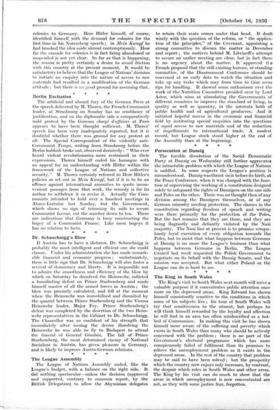The League of Nations Assembly ended, like the League's budget,
with a balance on the right side. It did nothing spectacular—unless the decision (approved and supported, contrary to common report, by -the British Delegation) to allow the -Abyssinian -delegates to retain their seats comes under that head. It dealt wisely with the question of,the reform, or "the applica- tion of the principles," of the Covenant, °appointing, a strong committee to discuss the matter in December and .report ; the motives behind 1sf. Litvinoff's attempt to secure an earlier meeting are clear, but in fact there is no urgency about the matter. It approved tl e French proposal that the still existing:bureau, or standing committee, of. the Disarmament Conference should be convened at an early date to watch the situation and take up any tasks which may from time to time seem ripe for handling. It showed some enthusiasm over the work of the Nutrition Committee presided over by Lord Astor, which aims at stimulating the Governments of different countries to improve the standard of living,, in quality as well as quantity, in the interests Moth of public health and. of agricultural producers. And it initiated hopeful moves in the economic and. financial field by instituting special enquiries into the questions of equal access to raw material's - and of the reduction of impediments to international trade. A modest record, but League stock stood higher at the end of the Assembly than at the beginning., * * * *




















































 Previous page
Previous page